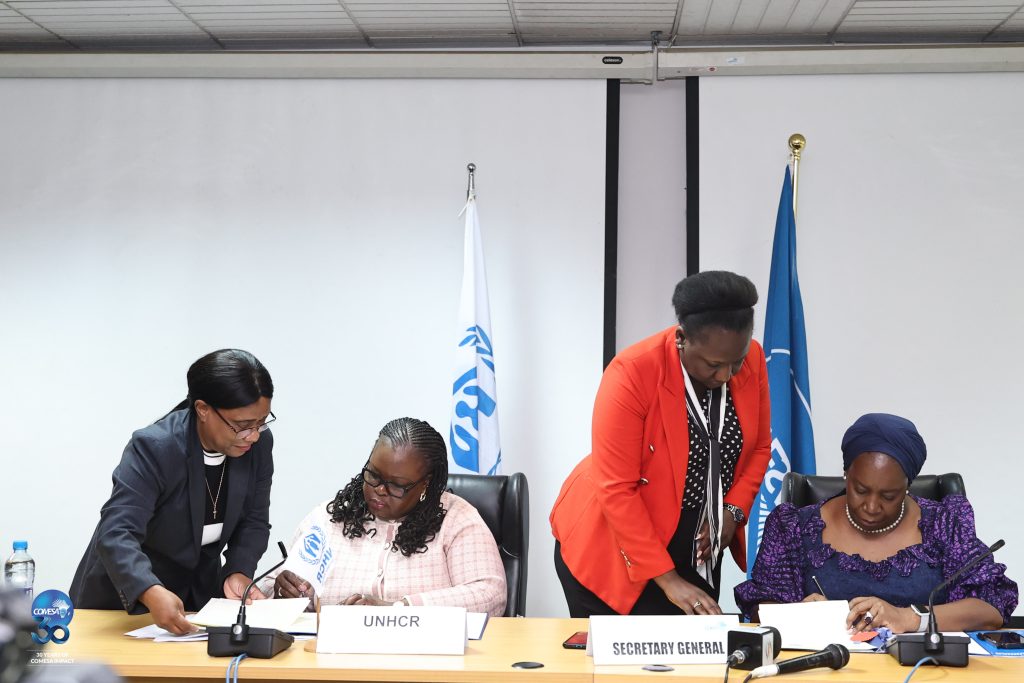
The Common Market for Eastern and Southern Africa (COMESA) and UNHCR, the UN Refugee Agency, today signed an important Memorandum of Understanding (MoU) to strengthen cooperation and collaboration to find lasting solutions for millions of people forced to flee their homes across the Africa due to conflicts and natural disasters.
This partnership builds on pledges made by COMESA Member States at the Global Refugee Forum in 2019 and 2023 and contributes to advancing the goals of the Global Compact on Refugees.
The signing of the MoU comes at a time when Africa is grappling with a growing displacement crisis, with more than 54 million people forced from their homes by conflict, political instability, and natural disasters. Southern Africa alone hosts over 22 per cent of the continent’s displaced population.
By combining UNHCR’s protection mandate with COMESA’s regional development expertise, the partnership aims to promote inclusion of forcibly displaced persons including refugees and internally displaced persons (IDPs) into national systems across the COMESA’s Member States as a means to providing them with pathways to sustainable livelihoods so they can lead stable dignified lives and live in harmony with local communities in the refugee hosting countries.
“This partnership sets the foundation for stronger regional collaboration to protect and support forcibly displaced persons and others affected by conflict, violence, and extreme weather-related displacement,” said Chansa Kapaya, UNHCR’s Regional Director for Southern Africa. “By working closely with COMESA and its Member States, we are building pathways for that hope to become reality. Together, we are not only working to ensure the rights and dignity of displaced people are upheld — we are reaffirming that they matter, and that they have a future.” She added that the MoU creates a framework to help ensure displaced persons are no longer left behind as the two entities work toward sustainable peace, resilience and economic growth.
COMESA Secretary General, H.E. Chileshe Mpundu Kapwepwe, welcomed the partnership, and emphasized the need to strengthen collaboration at both national and regional level, recognizing that displacement is not confined to national boundaries but has regional spillover effects into other countries requiring coordinated action.
She observed that COMESA has a wide-range of programmes and initiatives in governance, peace and security; trade; infrastructure; agriculture; energy as well as women, youth and gender equality, all of which can support the objectives of the UNHCR-COMESA partnership. She emphasized the importance of involving Member States as they are both affected stakeholders and active participants in regional solutions.
“it is therefore important to involve our Member States and specifically our communities in finding lasting solutions to the peace, security, and development challenges as they are the most affected and have a better understanding on the most appropriate solutions,’’ SG Kapwepwe said.
The MOU sets out areas of cooperation, including the inclusion of displaced persons in national services such as health and education; promotion of legal reforms to strengthen protection frameworks; and support for post-conflict recovery and environmentally sustainable development in refugees hosting areas. Special attention will be given to women, children, persons with disabilities, and survivors of violence.
UNHCR and COMESA will also work together to enhance early warning systems, strengthen data-sharing, create opportunities for socio-economic inclusion- particularly targeting groups most affected by displacement.
To implement the agreement, the two Organizations will establish a joint implementation committee and develop a detailed joint action plan to determine priority areas and actions. They are also committed to engaging governments, civil society, the private sector and development partners to mobilize resources and coordinate efforts across the region, ensuring a holistic and inclusive response that places displaced people at the center of regional peace and development strategies.

